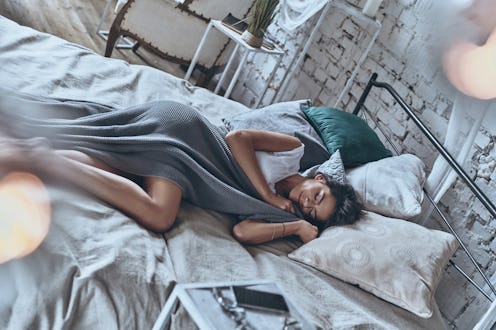(Living)
According To Experts, This Is The Best Mattress For Seriously Good Sleep

Getting a better sleep is likely a goal many of you have heading into 2020. Your increasingly busy lifestyle can often mean more stress, and that ultimately affects the quality of your slumber, which includes how many hours you're clocking. But besides adjusting certain habits like your screen time, the types of food you're eating, and trying to be as stress-free as possible, there's something else you can do to ensure better sleep, according to the experts. When asked does your mattress affect your sleep quality, they're weighing in and the answers might just have you shopping for a new one ASAP.
As a sleep and nutrition consultant, Ingrid Y. Prueher can assure you that what you're laying on at night can absolutely factor into how well — and how long — you're sleeping. Similar to the way luxury bedding can offer rest that's deeper and more restorative, the makeup of your mattress actually matters, especially in terms of how it supports your desired position, how it can regulate your body's temperature, and simply how it feels. "It is said that we spend one third of our life sleeping, so investing in efficient sleep products that will protect the quality of our sleep is absolutely worth it," she says.
So what should you be wary of when determining whether your mattress is helping — or hurting — your sleep? See ahead for a few factors to consider to make sure you're heading into the new year as well rested as possible.
Material Matters
There are a ton of different mattress materials on the market, from plant-based latex (made from rubber trees) to synthetic foam. Many sleep experts argue the advantage of sleeping on bedding that's as natural as possible, and Prueher explains that the same can be said for your mattress. "I do recommend avoiding materials that will create more body heat like polyester and other synthetics," she says. "These materials will interrupt your sleep should you become overheated."
As for some to look for, she suggest shopping organic cotton and wool options, in addition to the aforementioned natural latex. However, if temperature is your biggest concern, there are many modern brands using technology that makes even synthetic foam mattresses conducive to better sleep, such as gels or carbon which can have a cooling effect.
Find Your Ideal Firmness
There's no hard and fast rule for firmness, as that's going to vary from person to person. But what you do want to be sure of is that your mattress feels supportive and comfortable. And Prueher has a tip that can help you see what level of firmness you desire — before even setting foot into a store. "I recommend testing what kind of mattress you may need by laying down on the floor and feeling into how comfortable you are with the firmness of the floor," she says. "Add layers of towels until you feel comfortable to see how thick you may need your mattress to be. Let this be your guide as to how thick, soft and flexible you need your mattress to be to cover your areas of concern. You want a mattress that will help align your body to protect your most precious asset, your vertebrae."
Be Sure To Rotate
If you've never rotated your mattress, you could be missing out on better sleep, according to Prueher. "Rotating your mattress, head to feet and vice versa will help keep the structure of your maintenance so one side does not get more use than another."